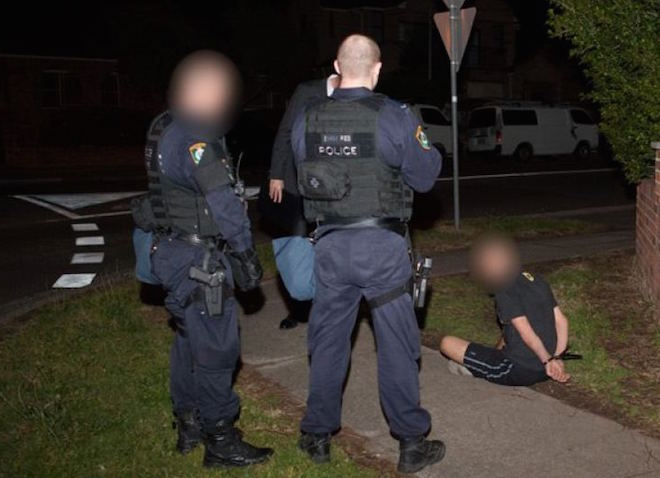Heightened terror alert, but the Ombudsman finds that preventative detention powers were never used between 2011 and 2013 ... Covert search warrant powers rarely used ... Crime Commission says it doesn't want covert search powers ... Improvements urged ... Nina Ubaldi reports
 Police raids in September reawakened the unused preventative detention powers
Police raids in September reawakened the unused preventative detention powers
EARLIER this month the NSW Ombudsman's review of anti-terrorism powers was tabled in parliament. Somewhat prematurely the Ombo observed in his report prepared two months earlier:
"Preventative detention regimes have never been used in any Australian jurisdiction."
The inactivity appeared to dampen the political case for the extensive powers, which allow police to detain people without charge to prevent an imminent terrorist act, or preserve evidence of terrorist acts.
The powers are due to expire in NSW on December 16, 2015.
The Ombudsman asked the Attorney General:
"To consider whether there is an ongoing need for the NSW Police Force to retain powers of preventative detention in light of the powers not having been used and the other powers available to police to respond to and investigate terrorism."
The report canvassed the questions: did the dormancy of the powers indicate their limited utility or, as argued by the Police Commissioner, illustrate the restraint of NSW police?
These questions soon lost some of their force. Within the month, the Supreme Court had ordered preventative detention orders against three men as part of September's counter terrorism raids.
This was not lost on NSW Attorney General Brad Hazzard. Responding to the tabling of the Ombudsman's report in NSW parliament, Hazzard warned that in the context of Australia's high security alert, the powers may be required again.
However, the report only addressed the use of anti-terrorism powers between 2011 and 2013. This was the Ombudsman's third such review, required by statute every three years.
The report examined two police powers under NSW terror legislation - preventative detention orders and covert search warrants. Preventative detention orders were introduced at the state and federal level following the London bombings in 2005.
Orders under Commonwealth legislation are limited to 48 hours because of constitutional concerns surrounding prolonged detention. However, under NSW legislation a person can be held for up to 14 days. Unlike in the United Kingdom, detainees cannot be questioned.
The Ombudsman also considered the use of covert search warrants, which allow police and the NSW Crime Commission to search premises without the occupiers' knowledge.
NSW police have applied for just five covert search orders, all in 2005. Police executed three of the orders, resulting in the conviction of five men who had built-up stockpiles of ammunition and bomb-making materials.
The Crime Commission says it doesn't want the covert search powers, as it doesn't have sufficient trained staff or resources to execute them.
The Ombo recommends the AG consider removing those powers from the Crime Commission.
Focussing most of its attention on PDOs, the Ombudsman noted a number of improvements in the procedures surrounding the use of the powers.
The report commended, for example, the clarification that young people (aged 16 or 17) cannot be held in adult correctional centres. The report also welcomed moves to protect detainees from unwanted media exposure following their release.
However, the Ombudsman remained critical of the operation of PDOs in a number of respects.
Nine years on, Corrective Services had not yet finalised its procedures for enforcing preventative detention orders. On November 11, Hazzard responded to these concerns assuring "the community that Corrective Services NSW has operational guidelines in place to manage those subject to a PDO".
The report also questioned the interaction of state and federal powers noting, "the apparent lack of guidance through a [memorandum of understanding] or some other more detailed interagency procedures is concerning".
Significantly, the report questioned the need for the powers altogether. Similar powers exist under ordinary policing statutes. Most, but not all, terrorism offences for example, could trigger the power to search covertly in the investigation of designated serious offences.
The Ombudsman also addressed three areas where PDOs served an important function - where police lacked sufficient evidence to arrest a person (the stated rationale behind the use of the powers in the September terror raids), where associates of terrorists may be tipped off, and where highly sensitive material was at risk of disclosure.
Although in each case the report suggested that these concerns could be mitigated, allowing PDOs to lapse would leave a gap in law enforcement powers.
In the words of the Ombudsman:
"The key issue then becomes whether this gap is of such magnitude and significance that it justifies the continuation of these extraordinary powers".